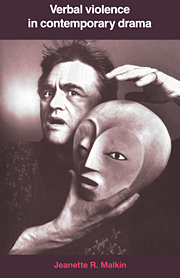4 - Language as a prison: verbal debris and deprivation
Published online by Cambridge University Press: 26 February 2010
Summary
In Peter Handke's play They Are Dying Out {Die Unvernunftigen sterben aus, 1973), the loquacious tycoon Quitt – who throughout has been seeking words with which to recreate himself – accuses his servant/confidant Hans of making fun of his language:
I would much prefer to express myself inarticulately like the simple people in that play recently, do you remember? Then you would finally pity me. This way I suffer from my articulateness being part of my suffering. The only ones that you and your kind pity are those who can't speak about their suffering.
Quitt explains, sarcastically, that the characters of that play moved him, for, despite their speechlessness, their poverty and seemingly dehumanized demeanor, they too seek contact:
They too want tenderness, a life together, et cetera – they just can't express it, and that is why they rape and murder each other … The animalistic attracts me, the defenceless, the abused and insulted.
Handke's semi-mocking remarks are obviously directed against a fellow playwright who, like Handke, is obsessed with the relationship between language and power, language and debasement: namely, the German Franz Xaver Kroetz. But unlike Handke's Quitt, Kroetz's socially depressed characters cannot protest their deprivation through meaningful speech – which is what they most basically lack.
Inarticulateness is not a new phenomenon in drama, but it has never in the past been used as the subject and entire substance of a play. Even Biichner's Woyzeck, the first and most famous of the modern inarticulates, is surrounded by more explicit characters who can control their language – and therefore also control him.
- Type
- Chapter
- Information
- Verbal Violence in Contemporary DramaFrom Handke to Shepard, pp. 102 - 161Publisher: Cambridge University PressPrint publication year: 1992



